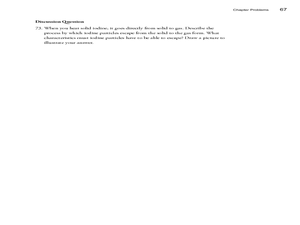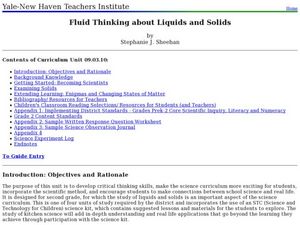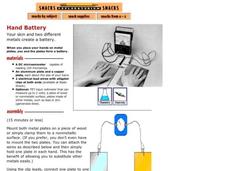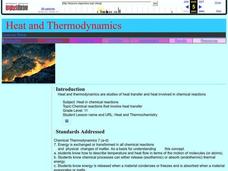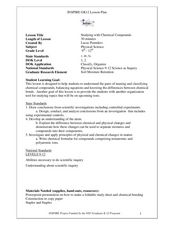Curated OER
Properties of Matter (Biomaterial Through Nanotechnology)
Students investigate friction between different surfaces. In this physics lesson, students research biomaterials that can reduce friction. They calculate efficiency using a mathematical formula.
Curated OER
It's Alive! Using Microorganisms in Cooking
Students create a KWL chart about food. In this chemistry lesson, students differentiate physical and chemical changes. They explain how microorganisms are used in food preparation.
Curated OER
The Structure of Matter and the Chemical Elements
For this chemistry worksheet, students answer 73 fill in the blanks and multiple choice questions on the structure of matter and properties of elements in the periodic table.
Curated OER
The Periodic Table Introduction Question Exercise
In this chemistry worksheet, students are introduced to the periodic table of elements. They find the answers to 13 questions about the periodic table.
Curated OER
Density Of A Material
Learners determine the density of a material created in the laboratory and observe physical and chemical changes. They engage in a lab activity, and answer questions on a worksheet imbedded in this plan.
Curated OER
Fluid Thinking About Liquids and Solids
Second graders examine the physical characteristics of the different states of matter. For this chemistry lesson, 2nd graders observe how matter changes from one phase to another. They classify substances according to its type of matter.
Curated OER
Alka-Seltzer Cannons
Fourth graders observe what is happening when an Alka-Seltzer tablet is placed in a clear cup of water. They observe the release of carbon dioxide gas. Pupils answer the question of how much as is released by observing the experiment...
Curated OER
Chemical Equations and Reactions
Graphic organizers, photos, diagrams, and text bring the world of chemical reactions to life. By viewing this presentation, young chemists learn how to recognize when a chemical reaction has occurred, and how to balance chemical...
Howard Hughes Medical Institute
Got Lactase? The Co-Evolution of Genes and Culture
Does the human body evolve as quickly as human culture? With a stellar 15-minute video, explore the trait of lactose intolerance. Only about 1/3 of human adults seem to still have the enzyme lactase and therefore, the ability to digest...
Exploratorium
Hand Battery
Get hands-on in your physical science class by having learners conduct electricity with their own hands! By placing one hand on each of two different metals, a current can be generated and measured on a microammeter. Make an experiement...
Curated OER
Air: Fuel For Thought
Students consider the impact of vehicle use in their family and brainstorm viable alternatives to this use. They calculate the total emissions for their family cars during the week, then compare those totals with Hybrid car totals.
Curated OER
Energy and Matter
A review of a full unit on energy and matter, this slide show starts with basic definitions of states of matter and their mass. It then develops the ideas of the forces that that matter can exert. Details about bonding within matter and...
Curated OER
Atoms and molecules
In this chemistry worksheet, students find the words that are related to atoms and molecules. The answers are found by clicking the link at the bottom of the page.
Curated OER
Heat and Thermodynamics
This is actually a 10-day mini unit on thermal energy for your high school chemists. Every avenue is taken to get learners absorbed in heat: a pretest, a PowerPoint presentation, Internet exploration, demonstrations, lab activities, and...
Curated OER
Studying with Chemical Compounds
Students create a foldable to help them remember topics on chemical compounds. In this physical science lesson plan, students differentiate ionic and covalent compounds. Given certain compounds, they identify whether it's ionic or covalent.
Curated OER
Chemical Composition of American Coins
High schoolers investigate the chemical composition of pennies dated 1983 or later. In this chemical composition of American coins lesson plan, students scratch the surface of the penny to expose the zinc core. They put the penny in...
Curated OER
Identifying Acids and Bases
Sixth graders observe the physical and chemical change that can occur in an acid and a base. In this acids and bases lesson plan, 6th graders use cabbage juice to identify, compare, and contrast acids and bases.
Curated OER
A Comparison of Polymeric Liquids with Newtonian Liquids
Learners perform several tests on liquids. In this general science lesson, students compare the properties of polymeric and nonpolymeric liquids. They explain the composition and importance of macromolecules.
Curated OER
Resources - A Reading Guide
In this resources worksheet, students compare and contrast physical and chemical properties and changes. Students review the periodic table, pattern of atomic numbers and chemical reactivity. This worksheet has 56 short answer questions.
Curated OER
Eggs'ceptional Experiments
Young scholars see evidence of chemical reaction and follow the scientific method to hypothesize, observe, and reach conclusions. They conduct a series of egg based experiments such as forming crystals and complete journal activities as...
Curated OER
The Scientific Revolution
Scientists participate in studying how new scientific advances have changed the world. They explain how astronomers have changed the way people view the universe, summarize the advances that were made in chemistry and medicine, and...
Cornell University
Thin Films
Combine mathematics and science to calculate measurements of unmeasurable materials. Individuals use knowledge of density and volume to determine the thickness of the film used in production. They also apply stoichiometry to determine...
Maryland Department of Natural Resources
Eyes on Dissolved Oxygen
Learn about the factors that affect the way oxygen dissolves in salt water with a chemistry lab. After studying the molecular structure of water, young scientists figure out how aeration, temperature, and organic waste affect dissolved...
Curated OER
Science: The States of Matter
Third graders conduct experiments in matter to create chemical changes resulting in gases. By mixing solids and liquids, they create a chemical reaction and capture the gas in balloons. After observing the balloons fill with carbon...




